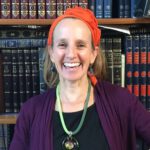At once deeply traditional and counter cultural, haburot is wellbeing practice that’s power rests in a sense of purpose, achievement, and fellowship. Over the last two thousand years, haburot have proven themselves as a timeless Jewish pedagogy. Diverse contemporary immersive learning settings can adapt this pedagogy by adopting elements from kabbalistic, hasidic, Mussar, and modern secular models. Students select intimate affinity groups with shared goals and resolve to take responsibility for their personal achievement. They create a group manifesto inspired by that of Rabbi Kalman Kalonimus Shapiro’s Bnei Machshavah Tovah, commit to a guiding goal and working together to achieve it. Regular meetings create a deep sense of belonging and fellowship, space for processing, accountability and mutual support. With the use of Haburot, a learning community can increase individual and group wellbeing by enhancing a sense of unity in diversity and personal and communal responsibility for learning and belonging.
Haburah as a Jewish Pedagogy of Wellbeing
More PEDAGOGIES RESOURCES
Pedagogy of Nuance: Finding Comfort Through Storytelling
Devorah Levine Katz
Founder of Meshek48
Meshek48
The pedagogy of storytelling allows us to value nuance and new perspectives.
Access ResourcePEDAGOGY OF PLAYFUL ENCOUNTER PROPAGATING THE DIVINE
Aura Chaya Bitton-Gispan
Founder and Director
The Harmonium Sanctuary and Retreat Center
To engage in Regenerative Torah is to enter the relational ring of a personal encounter with the Divine.
Access ResourceCultivating Curiosity: A Jewish Pedagogy of Wellbeing
Rabbi Paul Cohen
Senior Rabbi
Temple Jeremiah
The pedagogy of cultivating curiosity allows us to become better versions of ourselves through creativity.
Access ResourceA Jewish Pedagogy of Creative Wellbeing: Connection through Wonder
Fraidy Aber
The Constance Wolf Director of Education and Civic Engagement
Contemporary Jewish Museum
Embracing the pedagogy of wonder can foster greater understanding and interconnectedness.
Access ResourceRega Shel Shtika: How Quieting Fosters Ethical Behavior
Rabbah Dr. Mira Neshama Weil
Founding Teacher
Neshima.
Reintroducing practices of silence within Jewish learning communities can foster ethical behavior.
Access Resourceנענוע (Na’anua): A Pedagogy of Jewish Transformative Movement
Rabbanit Dalia Davis
Director of Pastoral Education
SVIVAH
Using the transformative power of movement to feed the soul.
Access Resource